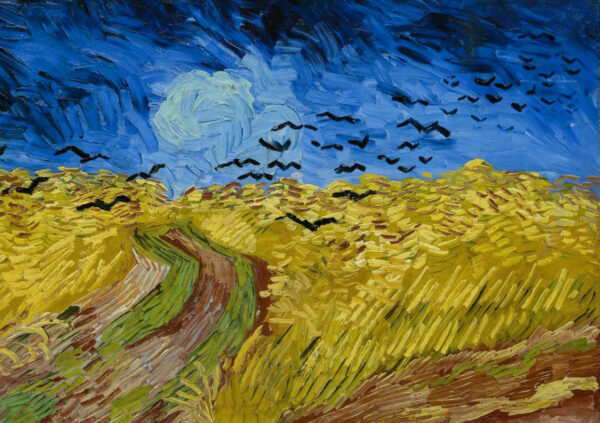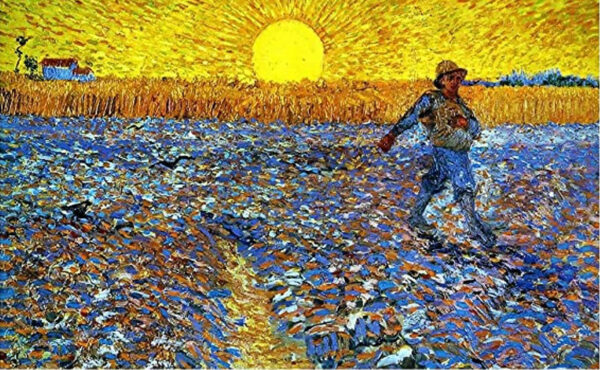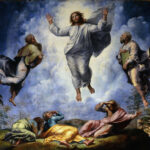Fifteenth Sunday in Ordinary Time
– Year A
The First and Second Readings refer us to a grand divine plan, of course hard to grasp with our limited minds. This plan entails Creation in all its manifestations of the physical world as we know it (including the Matterhorn, the Great Barrier Reef, a vulture eating a half-rotten carrion), but it contains, by design, as a crucial element, the painful journey of the Church (with all its limitations and glories).
Just as we can appreciate the self-sustained nature of the water cycle that we all studied in elementary school (or whatever these schools are called now), similarly the Word of God doesn’t go out without bearing fruit.
We must learn to appreciate the deeper order that is present inside this grand plan. To be savored, contemplating the Creation in Psalm 64.
And yet… It’s complicated. Saint Paul tells us, in the Letter to the Romans, that the plan includes our world being enslaved by corruption: what in a catechism book we call the Original Sin; while in a science book, discussing topics that only appear to be far removed from the present one, we speak of Entropy (disorder).
After all it’s our common experience: we can observe this disorder every day, everywhere, around us.
Creation is groaning, as if it were about to give birth. The fruit of redemption will come through a challenging process, full of obstacles. It takes a storm to get a rainbow.
Jesus comes to bring us salvation, to give meaning to our existence. This is the core of our redemption.
But how?
Here comes the Sower.
Jesus is the one who sows.
Some seeds are wasted because they fall on the road; some are choked by weeds, others fail to grow due to a shallow soil; and then there are seeds that bear fruit.
Here, in this long Gospel passage, some difficulties call for our attention.
Jesus speaks through a parable, and then explicitly indicates that
1- the parable itself is made so as not to make its content comprehensible to the crowds to which it is proclaimed;
2- The aim would seem to be precisely that of creating a sort of separation: as if there were the “initiates”, to whom secret knowledge is revealed, and the common people, who are left in the dark.
Note that these words, if taken as they appear at first blush, are really problematic:
Because knowledge of the mysteries of the kingdom of heaven
has been granted to you, but to them it has not been granted.
To anyone who has, more will be given and he will grow rich;
from anyone who has not, even what he has will be taken away.
A supreme injustice, then?
Seriously! We knew, or thought we knew, that
1a- parables are used to make complex contents easier, accessible to all: to clarify, not to obscure; moreover…
2a- didn’t in fact Jesus Christ teach in the open, bringing a message addressed to everyone without distinction, the exact opposite of a doctrine for initiates like the Gnostic ones?
For example see Matthew 10:26, which is fundamental because it is part of a sort of manifesto for the mission that Jesus entrusts to the Apostles:
Therefore do not be afraid of them. Nothing is concealed that will not be revealed, nor secret that will not be known.
How come?
An initial answer comes to us from Matthew 10:27, which follows:
What I say to you in the darkness, speak in the light; what you hear whispered, proclaim on the housetops.
Here again we can appreciate how it’s complicated, there’s a constraint that makes the process non-trivial: preaching has a completely anomalous first phase, when facing the people of Israel. In the beginning not everything can be revealed, but only as a consequence of a historical contingency, through a period of preparation.
Faced with stubbornly opposed witnesses, who are unable and unwilling to understand the context, a parable instead of illustrating a teaching is actually muddying the waters, obscuring the contents.
While of course, for those like us a parable is used precisely to explain difficult concepts in a more accessible way. After all, we have a direct experience of this clarity.
But in some cases, certain parables have also performed this peculiar function: planting a seed, launching a message in front of people who were absolutely unable to grasp it.
Explanation with Saint Pius X
The connection between these two types of effects, which at first seem so incompatible, is actually evident to anyone who reflects on what used to happen with the catechism of a few decades ago, the one articulated on pre-digested formulas, in the form of questions and answers: abstruse statements that one had to memorize. In that case it was literally the same person who, being at first unable to understand (as a child), received those messages that seemed impossible to decipher; but then, once an adult, bringing to mind those never forgotten formulas, he (she) could begin to discover their meaning, depth and wisdom, already possessing them, having them loaded inside him (or her), so to speak.
The memory of history works in a similar fashion.
Back to humanity, this idea brings us even closer to the solution of the dilemma: sometimes it is necessary to leave a mark by sowing precisely where it seems that it should not bear fruit, because there are constraints of another type, linked to the need to be credible in the face of history.
A Gospel preached only to those who appreciate and share it would have been accused, even more than it already happens today, of having been extensively reworked to meet the interests of the primitive Christian community, to the point of retaining very little of an authentic testimony.
The presence, on the other hand, of witnesses from the opposing party, and of a pre-existing Jewish religious tradition that continues, allows us to rely on a series of firm points.
Even in the harshest contrast, in a hostility that only seems counterproductive, there are therefore opportunities for grace. The plan unfolds despite, and indeed thanks to, human misery.

Crows on the road according to Van Gogh (detail)
3 reasons to sow on the road, where the seed will not be able to germinate
- I’d say that if God hadn’t set the conditions for the existence of a large community of Israel that rejects Christ during his coming, and continuously afterwards, over the centuries… today many exegetes would even treat a large part of the Old Testament as a more than dubious text, perhaps for the most part written after Jesus. At any rate, modified at the discretion of the Christian community, unreliable on principle.
- Additionally, Jesus’ sowing with generosity also corresponds to knowingly offering an opportunity to everyone, even to those He already knows would never want to take it, due to an invincible distance and hostility. Perhaps we can call this a matter of justice.
- As I’ve already mentioned in the past, it is also necessary to respect the times of preaching, by getting across a message which at the beginning cannot be too direct and complete, since in that case it would be misunderstood.
Let’s consider the concept of Jesus as the Messiah: such a revelation couldn’t happen too soon, because most would have taken him for a completely different type of messiah, interpreting his every gesture according to their expectations. At that point it wouldn’t have mattered what Jesus taught personally, because in the meantime crowds would have gathered who attributed to him, by feel, ambitions of a wannabe ruler and exploits of a political agitator.
Instead, having to gradually discover who Jesus was, disciples had to go through a journey of primarily cognitive growth; to then possess (in their hearts, in their minds) a truly new and consistent Gospel, to transmit to others.
Even the road has its uses.
Some nuggets are hard to extract…
I’ll paste again here another potentially problematic phrase:
To anyone who has, more will be given and he will grow rich;
from anyone who has not, even what he has will be taken away.
Normally we would expect an opposite message: those on top fall and those on the bottom rise. Be patient, I think it’s better to address the issue another time, but I would like to underline that this point seems quite neglected. There’s a huge submerged part in this iceberg.
Finally, the message of the Sower, very beautiful and direct.
When Jesus mentions the fruitful soil that, depending on its qualities, yields in varying quantities, we can appreciate this fundamental concept: not all good is the same, even in that there are degrees.
Giving more: it’s worth it! This doesn’t take anything away from those who did things right, but did relatively little; it’s just that a greater good becomes a great treasure for all of us.

With this sower Van Gogh instead seems to want to see the good, sunny side.
This parable is deeply, painfully felt when it speaks of plants that initially take root but then die.
Oh, how I can see myself depicted as the land where the good seedling is dominated by weeds! So much nonsense, so many interests that lead nowhere, so many side activities performed to follow conventions, that steal hours from our day and absorb our attention! To make a good impression, to distract ourselves… things everybody likes, things everyone else does… We could have had holiness, we have hobbies, a wardrobe and a nice house. And then a glitzy car, video games, TikTok, TV series marathons… Oh, what about choosing the best schools for my daughter, celebrating a birthday with a professional clown and an inflatable castle, dying over an expensive dress you saw on sale, and could use for the prom…
And worse still, after a quick soul searching, consider: how painful, to look at that arid, stony, shallow soil, where plants are unable to grow, if not for a very short time, but then they dry up… One really wants to ask, feeling miserable: “Lord, am I like that?“
When put to test, facing a trial, do we know how to stand fast, or do we give up immediately?
What about Satan then?
Perhaps now you may appreciate how we can try to explain the most mysterious and disturbing case of all (at least to the best of my knowledge: this series of articles is basically an experiment, I’m not an expert or an exegete)…
I said it before: there are situations that are intrinsically impervious, there is total closure. I don’t know which moral theologian must have invented the appropriate wording: “invincible ignorance”.
We should be painfully foolish servants, if we try to do better than the Sower, and we stubbornly believe we can find some special trick, some creative solution, just to try to make something germinate right smack in the middle of the road, on asphalt (or dirt).
With the only effect of distorting the mission.
The seed thrown along the road not only does not germinate and does not bear fruit, but the birds take it away. Which may already seem weird, but it becomes even more so once explained (!): the evil one comes, which is Satan, and takes them away.
Why the evil one?
There are many ways to look at it, the issue is complex and I may not give the best answer. Surely it will be incomplete and imperfect.
First of all Satan cannot intervene directly to change your life: it is not he who makes you superficial and fickle, or too much a slave to worldly interests. No, he intervenes where there was really no ground. Your freedom is safe, and he believes he intervened but essentially had no effect.
OK then, this whole concept may not be outrageous, after all. But what’s the use?
I think it is appropriate (because the world is always more complicated than we can imagine, in our naivety) that the rebellion against God isn’t just present in our world indirectly, as a generic effect, but is made real through actions and presences, however invisible; at the same time, it couldn’t be something decisive, something which steals the show: it remains a detail in the background.
Focusing your attention on this specific issue from time to time: speaking – in the correct terms – of Satan is useful.
It is psychologically useful for us to externalize evil, in order not to be slaves to it or to be afraid of it; to understand that evil does not come from within, from what we really are, but is an external force that we can resist: just be aware of it.
This teaching can be of great help to us in an era where “born this way” is a slogan that applies to any fleeting self-perception, mostly derived from outside factors.










































